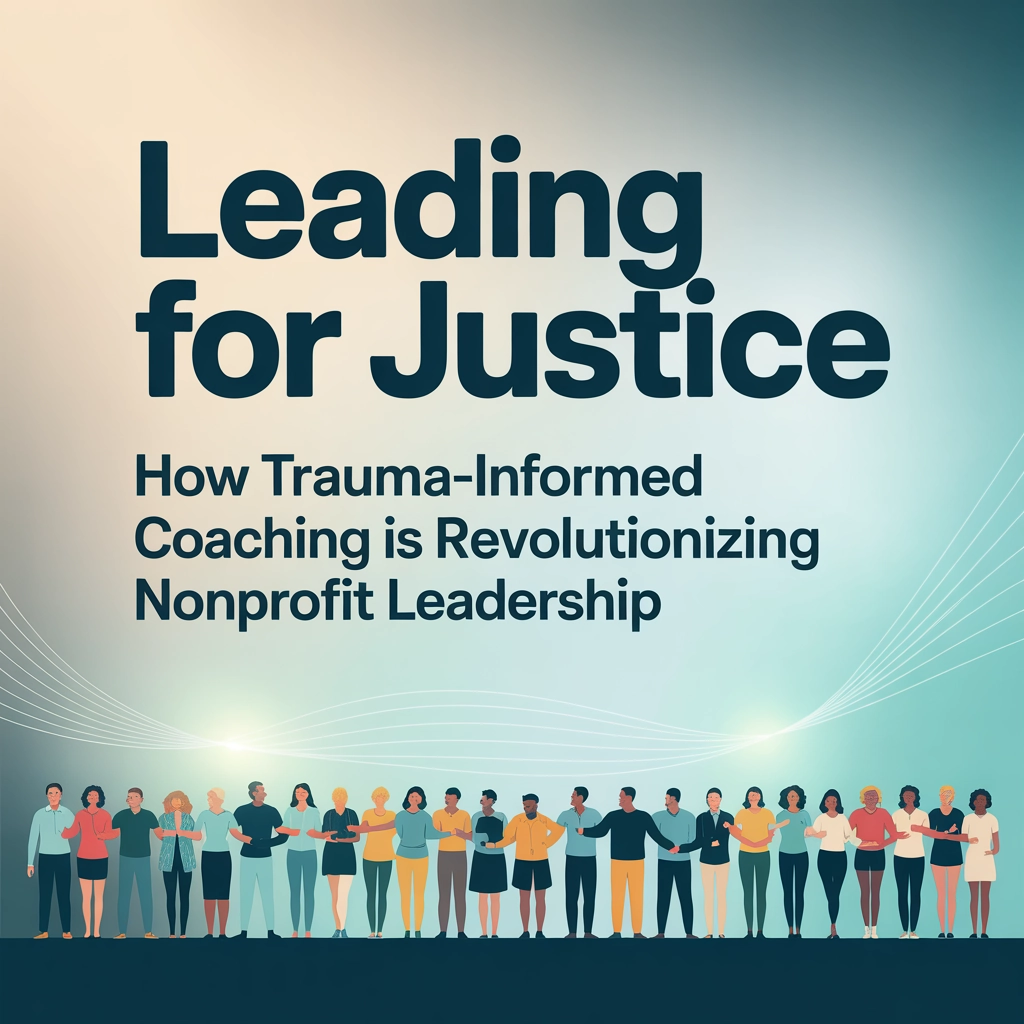
The Hidden Challenge in Justice Work
Leading a nonprofit organization dedicated to social justice isn’t for the faint of heart. From securing sustainable funding to navigating complex community needs, nonprofit leaders face daunting challenges daily. But there’s another obstacle that rarely makes it into strategic plans or board discussions: trauma.
Trauma—whether experienced personally, witnessed in communities served, or absorbed through the work itself—profoundly impacts how nonprofit leaders show up, make decisions, and sustain their organizations. This reality has sparked a revolution in leadership development: trauma-informed coaching.

Understanding Trauma-Informed Leadership Coaching
Trauma-informed coaching integrates neuroscience, psychology, and social justice frameworks to help leaders recognize and address trauma’s impact on themselves, their teams, and their organizational structures. Unlike traditional executive coaching that might focus primarily on strategy and skills, trauma-informed approaches acknowledge that unaddressed trauma can sabotage even the most brilliant plans.
Trauma-informed coaching doesn’t replace therapy—it’s a professional development approach that creates space for leaders to:
- Recognize trauma responses in themselves and their teams
- Develop resilience practices for sustainable leadership
- Implement organizational policies that prevent retraumatization
- Transform trauma awareness into more effective advocacy
This framework proves especially crucial for nonprofits addressing systemic injustice, where leaders routinely witness community trauma while navigating their own experiences of marginalization.
Five Ways Trauma-Informed Coaching Transforms Nonprofit Leadership
1. From Reactivity to Responsive Leadership
Without trauma awareness, leaders often operate from their nervous system’s alarm state—especially when confronting systemic injustice. This manifests as:
- Decision-making driven by urgency rather than strategy
- Difficulty delegating or sharing power
- Black-and-white thinking that misses collaborative opportunities
- Persistent feelings of scarcity, regardless of actual resources
Trauma-informed coaching helps leaders recognize their stress responses and develop practices for returning to their regulated, creative brain. This shift allows for more strategic decision-making, especially during crises when communities need level-headed leadership most.
“I used to pride myself on being available 24/7,” shares T. Johnson, founder of a community initiative. “Through trauma-informed coaching, I realized my ‘always-on’ approach wasn’t dedication—it was a trauma response from growing up in a household where I had to stay hypervigilant. Learning this distinction completely transformed how I lead. I now model boundaries and sustainable practices for my team.”
2. Breaking the Burnout Cycle
Nonprofit burnout isn’t just about long hours—it’s about how unprocessed trauma creates unsustainable patterns.

Trauma-informed coaching breaks this cycle by helping leaders:
- Identify personal trauma triggers in their work context
- Implement organization-wide practices that honor humanity
- Create cultures where rest is valued as essential to justice work
- Develop metrics beyond productivity that measure well-being
3. From Lone Hero to Collective Leadership
Many nonprofit leaders fall into “savior” patterns—taking excessive responsibility while struggling to trust others or share power authentically. Trauma-informed coaching reveals how these patterns often stem from early experiences where safety depended on control or hyperresponsibility.
“I was the ultimate micromanager,” admits C. Vega, who works with a criminal justice reform organization. “Through trauma-informed coaching, I discovered this behavior was connected to childhood experiences where I couldn’t trust adults to follow through on promises. Once I recognized this pattern, I could begin building genuine distributed leadership models that actually advance our justice mission more effectively.”
Trauma-informed approaches help leaders:
- Distinguish between responsibility and over-functioning
- Develop trust-building practices within teams
- Create transparent decision-making processes
- Implement succession planning that honors institutional knowledge
4. Embodying Equity in Organizational Practices
Justice-oriented nonprofits often struggle with the gap between external advocacy and internal practices. Trauma-informed coaching addresses this disconnect by helping leaders recognize how unhealed trauma can perpetuate harmful dynamics even within progressive organizations.
Concrete shifts include:
- Revising hiring practices to value lived experience alongside credentials
- Creating conflict resolution processes that don’t replicate punitive systems
- Implementing feedback mechanisms that account for power differentials
- Developing compensation models that prioritize equity and transparency
5. Transforming Vicarious Trauma into Collective Resilience
Nonprofit leaders working with marginalized communities frequently experience vicarious trauma—the cumulative emotional impact of witnessing others’ suffering. Without proper support, this can lead to compassion fatigue, cynicism, and diminished effectiveness.

Trauma-informed coaching transforms this challenge by:
- Normalizing the neurobiological impacts of justice work
- Creating team practices that process collective emotions
- Implementing organizational rituals that celebrate wins and honor losses
- Developing metrics that value relationship-building alongside outcomes
Implementing Trauma-Informed Leadership in Your Organization
For nonprofit leaders interested in this approach, consider these starting points:
- Begin with personal reflection: How might your leadership style reflect your own trauma responses? What triggers push you into reactivity?
- Assess organizational patterns: Where do you see signs of collective trauma in your nonprofit’s culture? Look for persistent urgency, difficulty celebrating wins, resistance to rest, or unhealthy conflict patterns.
- Start small: Implement one trauma-informed practice, such as beginning meetings with a brief grounding exercise or creating space for authentic check-ins beyond work updates.
- Seek skilled support: Trauma-informed coaching requires specialized training. Look for coaches with backgrounds in both leadership development and trauma-informed approaches.
- Commit to ongoing learning: Transforming leadership patterns takes time. Prioritize consistent reflection and practice rather than expecting overnight change.
The Justice Connection
At Justice Over Everything (JOE), we believe effective leadership coaching must address trauma if we truly want to create sustainable change. Our trauma-informed coaching programs specifically support nonprofit leaders working on the frontlines of social justice movements.
“The organizations making the most significant impact in justice movements are increasingly those implementing trauma-informed leadership practices,” notes Dr. Rebecca Chen, organizational psychologist. “They’re creating cultures where healing and justice work happen simultaneously, rather than sacrificing well-being for the cause.”
As nonprofits face increasing demands with limited resources, trauma-informed coaching offers a revolutionary framework—not just for preventing burnout, but for creating organizational cultures that model the justice they seek to create in the world.
For nonprofit leaders ready to explore how trauma-informed coaching could transform their leadership and organization, contact our team to learn more about our specialized coaching programs for justice-oriented organizations.
Because true justice requires leaders who can sustain themselves for the long haul—and that sustainability begins with addressing the impact of trauma on our leadership journeys.


